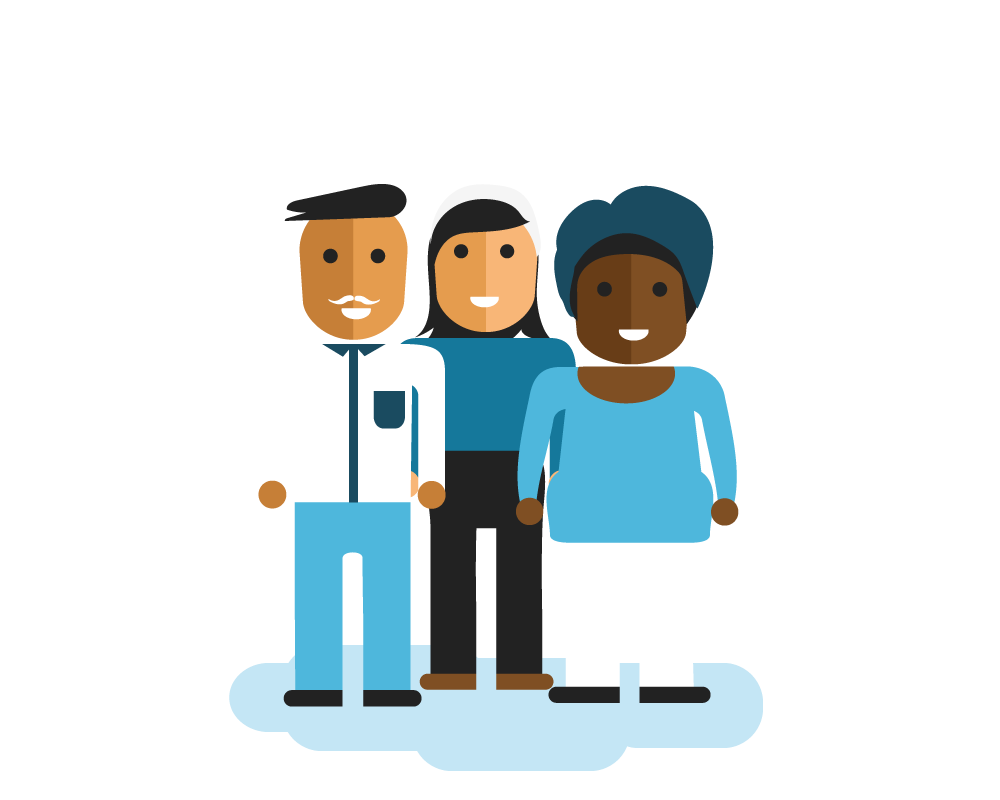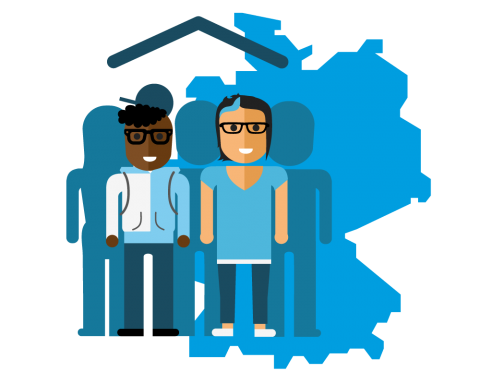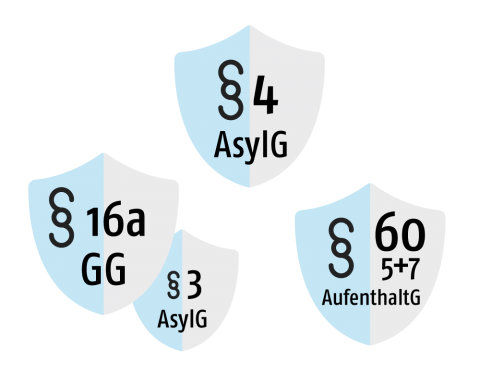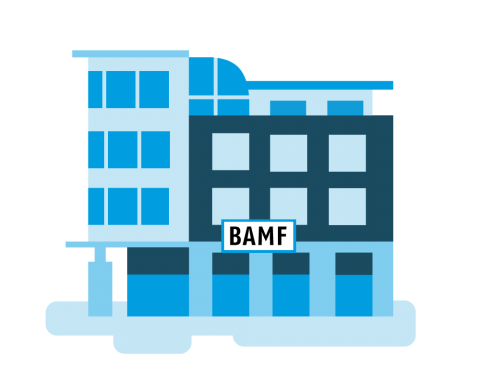Find out more about your right to protection
On this page, you can find out everything about your right to protection. Watch the video in one of nine languages and find out more about your rights in Germany. Underneath the video, you will find a detailed text where you can read everything through again. In the text, important words are also explained in simple terms.

Have you received all the necessary information?
Here, you can calmly read over all the information that was mentioned in the video once more. Important terms are also explained here once again.
Can I find protection in Germany?
If you are under threat of persecution, torture or death in your country of origin, you have a right to protection and are allowed to live in Germany. Germany is required by its constitution and by international laws to provide protection to people who cannot find any anywhere else. If you have already been in another European country, however, that country might be responsible for your protection.
What does protection mean?
As long as the need for protection exists, you may live, work, study and go to school in Germany. Social rights, such as the right to medical care, benefits and support in dealing with particular life situations, also apply to you. If you would like to know more, you can watch the video My Right to Participation.

When can I get protection?
You receive protection in Germany if your basic human rights are being seriously violated in your country of origin.
There are three kinds of protection:
Having a right to asylum (according to Article 16a Basic Law)/Refugee (according to Article 3 Asylum Law):
You will be recognised as having a right to asylum or as a refugee, if you are personally being persecuted due to the following reasons:
- Your nationality
- Your religion
- Your political beliefs
- Belonging to a certain social group (for example, due to your gender or sexual orientation)

Subsidiary protection (according to section 4 Asylum Law):
If you are not being persecuted due to the factors listed but are in still under threat of serious harm, you will get subsidiary protection. Serious harm exists if you are under threat of the death penalty or torture or if there is a risk to life and limb because war, civil war or armed conflict is prevalent in your country of origin.
Ban on deportation (according to section 60, (5) or (7) Residence Law):
If the above conditions do not apply to you, a ban on being deported can still exist, if:
- there is a specific danger to life or limb or your freedom
- being deported would lead to violation of your basic human rights.

Why are these differences important?
Your social rights and the length of your residence permit very much depend on what rights to protection you have been given. For example, they can make a difference to your family reunion, participation rights or acquiring a permanent residence permit in Germany.

How is what kind of protection I get decided?
What you say at your application hearing during the asylum procedure is important. For this reason, you must be very well prepared for the application hearing and take advantage of counselling to advise you on this. Afterwards, the Federal Office for Migration and Refugees will examine all the possibilities and provide the best kind of protection possible. If you believe that the decision of the Federal Office is not correct, you should make use of your right to a court action. For this, you can take advantage of legal advice.
If you would like to know more about how to stay in Germany, watch the My Right to Stay video.

Here you find explanations of important terms.
Country of origin
The country from which a person comes is their country of origin. In most cases they have the nationality of this country.
Persecution
Being persecuted means that one’s basic human rights are being seriously violated. Persecution is recognised as grounds for granting protection in Germany, if a person is persecuted due to their own nationality, religion, political beliefs or membership of a group (for example gender or sexual orientation).
Constitution
The constitution is the key legal document of any state. In the constitution, principles about the form and structure of a state are laid down. Furthermore, the constitution sets out the rights and duties of a state and its citizens.
European country
Important in this context are the countries Belgium, Bulgaria, Denmark, Germany, Estonia, Finland, France, Greece, Great Britain, Holland, Italy, Ireland, Iceland, Croatia, Latvia, Liechtenstein, Lithuania, Luxembourg, Malta, Norway, Austria, Poland , Portugal, Romania, Sweden, Switzerland, Slovakia, Slovenia, Spain, Czech Republic, Hungary and Cyprus.
Grounds for protection
In Germany, it is enshrined in law that persons will receive protection if certain basic human rights are being seriously violated in their countries of origin. There are different kinds of protection which are regulated by the Basic Law, Asylum Law or Residence Law.
Participation
Participation is the opportunity to fully take part in the life of society. This means that basic needs such as shelter, food and health care are guaranteed. However, it also means that persons can participate in education and culture and can live without fear of violence.
Basic human rights
The United Nations (UNO) have reached an agreement: the “Convention for the Protection of Human Rights and Fundamental Freedoms”. This agreement says that all persons have the right to life. The agreement bans torture, slavery, forced labour and unlawful punishment.
Nationality
Nationality is a person’s own state citizenship. It can also mean belonging to a group characterised by certain commonalities: by their cultural, ethnic or linguistic identity, their shared geographical or political origin or their relationship with the population of another state.
Sexual orientation
Sexual orientation describes with whom a person enters into sexual, romantic or emotional relationships. This means one can feel attracted to others of the same gender (homosexuality) or to persons of a different gender (heterosexuality). It also includes the fact that one can find both genders attractive (bisexuality) and all genders (pansexuality). Further, it describes whether one has relationships with several people at once (polysexuality) or no sexual relationships at all (asexuality). People who have the same sexual orientation often connect within ‘communities’, where they can interact with and support each other.
Refugee
Refugee is a collective term for persons who have to leave their country of origin temporarily or permanently due to political persecution, wars, or life-threatening states of emergency.
According to Article 1 of the Geneva Convention on Refugees, persons are designated as refugees if they do not live in their country of origin and were persecuted there due to one of the following reasons:
• their race
• their religion
• their nationality
• their political beliefs
• their membership of a particular social group
And also, if the persons can find no protection in their country of origin and cannot return there for fear of persecution.
Refugees entitled to political asylum
A person is designated as having a right to asylum when their right to asylum are granted. Persons suffering from political persecution who are threatened by serious human rights violations in their countries of origin have a right to asylum, according to Article 16a of the Basic Law (in the German Constitution). After entering Germany via the European Union member states, as well as via Norway and Switzerland, an approval of a person’s right to asylum is refused.
Physical integrity
Physical integrity is a person’s physical and psychological health.
Residence permit
A residence permit is the required authorisation to enter and stay in federal territory. There are limited and unlimited residence permits.
Family reunion
Family reunion means that family members (usually spouses and children) can also come to Germany. To apply for this, the person already living in Germany must have German citizenship or a valid residence permit.
Participation benefits
Participation benefits are financial, material or social benefits that enable people to fully participate in the life of society.
Permanent residence permit
This is a residence permit without limited duration, i.e. the qualifications for it only have to be demonstrated once. Even if the qualifications can no longer be met in the future, for example due to losing one‘s job, with the right to permanent residence, a person will receive the assurance of being able to stay in Germany and can plan for the future.
Specific danger
Specific danger means that it can be assumed that a person will be harmed in the near future.
European Human Rights Convention
The European Human Rights Convention is a contract in which the participating states have agreed to adhere to human rights and have promised to guarantee them.
Court
A court makes a decision in the event of a dispute and can impose penalties.
Application hearing
The application hearing is very important. It determines which residence status you will get. At the application hearing during the asylum application process, you will be asked questions about grounds for protection and about your escape route. Prepare well for your hearing and make use of counselling about this. What is important is what the situation in your home country was, why you had to flee and how you entered Germany. Bring all the documents with you which offer evidence for your story. During the application hearing, you have the right to have an interpreter. It is vital that you answer all questions in as much detail and as well as possible.
The Federal Office for Migration and Refugees
The Federal Office for Migration and Refugees (BAMF) [Bundesamt für Migration und Flüchtlinge] is responsible for undertaking asylum proceedings, integration courses and migration counselling.
Counselling
There is counselling in Germany for many issues. You can find a list of the various counselling centres here. People can get information and support from experts there. Most counselling centres are free of charge. They are not state-run, but instead are independent centres that act in the interest of persons seeking advice and do not pass on any information without you being asked.
Basic law
The Basic Law is the German Constitution.
Asylum law
The Asylum Law is the law that regulates the legal requirements for the protection of persons seeking asylum in Germany, as well as the asylum proceedings and the asylum process.
Residence Law
Residence law comprises the basic legal foundations for foreigners’ entry, exit and residence in Germany.
Getting deported
If persons are not granted protection in Germany, they will be legally required to leave the country. If they do not leave voluntarily, they will be deported. This means that they will be forcibly moved to another country.

